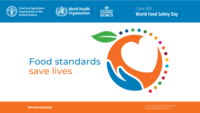World Food Safety Day Exclusive: 'Food Safety is an Essential Part of Our Daily Lives'
A Q&A with Ana Maria Coronado, M.B.A., International Food Safety Expert and Consultant, Peru

Image credit: jarmoluk via PIxabay; FAO/WHO
Note: This interview has been edited for length and clarity.

Photo: Ana Maria Coronado celebrates World Food Safety Day 2024, which has the theme of "Prepare for the unexpected"
FSM: World Food Safety Day, spearheaded by the World Health Organization (WHO) and the Food and Agriculture Organization of the United Nations (FAO), is celebrated each June 7 to draw attention and inspire action to help prevent, detect, and manage foodborne illness risk. The theme of this year's World Food Safety Day is "Prepare for the unexpected." What is the importance of this theme to the global food chain?
AMC: It is of utmost importance because each actor or participant in the food chain fulfills a role of responsibility at a global level wherever they are, from a small agricultural producer to the final consumer. That role of responsibility involves prevention; that is, we must all be prepared for any unforeseen event or any situation that will break the food safety chain. This can happen even though we are fulfilling our responsibilities. This means that zero risk will never exist, and in that sense we must be prepared for exceptional situations.
Food safety can be broken anywhere; it is not dependent on the size of the event. It can be cross-contamination in the home, such as using unsanitary utensils to prepare food; or contamination of canned fish by parasites; or food spoilage due to inadequate temperature control during transport.
This is why, on June 7 of each year, FAO and WHO encourage us to be proactive in the global food chain. Regulators, especially, have a large role to play. Governments must strengthen health surveillance and control systems in establishments that prepare or produce food, rather than merely implementing administrative procedures that allow for the marketing of food but do not guarantee the safety of it. Governments should also host education sessions so that consumers understand how to act in the face of an unpredictable event that can affect food safety. Consumers should also have access to, and be taught, simple routes to report a food safety incident.
FSM: How do you address this theme in your own food safety work within the regulatory and industry sectors?
AMC: I have 25 years of experience promoting food safety to various sectors including the government, the private food industry, and international organizations, among others. I have addressed the issue of food safety by developing regulations and national standards in Peru to implement food safety in non-traditional food markets and restaurants, as well as applying risk assessment and control of critical points (HACCP) for Peruvian food manufacturing establishments. For example, I have developed regulations for the import and marketing of food additives and participated in the development of best practice guidance for cocoa. I have also trained food exporters for various world markets and developed sanitary requirements for the export of food. I also participated as a Peruvian delegate on the FAO/WHO Coordinating Committee for Latin America and the Caribbean (CCLAC), presenting the current Codex "Regional Standard for Lucuma" (CXS 305R–2011),1 among other regulations.
The spirit of food safety regulation is to guide every company that wants to become involved or is already involved in the global food chain. While serving the Peruvian government from 1999 to 2012, I guided the industrial sector to progressive compliance with food safety regulations. In my current position as a food safety consultant, I train and audit food industries so that they can raise their safety standards in the processing, marketing, import, and export of food, and avoid causing foodborne illnesses or breaking the safety of the food chain.
I also strive to raise food safety awareness in both the government and industry sectors, which is why every year, on June 7, I promote World Food Safety Day with photos, videos, podcasts, webinars, and other efforts to spread the importance of this day in the media.
FSM: You have trained and worked with indigenous, traditional, and smaller-scale food producers in several South American countries, through initiatives such as the UN Development Program (UNDP) and others. What are some major themes and food safety challenges that you have observed during your training and consulting work, and how did you work with food producers to address them?
AMC: In order to raise their food safety standards and do their part to guarantee food safety in the global supply chain, Amazonian indigenous populations and smaller-scale food producers need to improve their value chains. They must strengthen the scale of industrialization of their food, which is often produced using ancestral techniques. They must also ensure application of good agricultural practices (GAPs) and/or good manufacturing practices (GMPs) in their agricultural, poultry, fishery, and other operations, as well as in the marketing of food from their communities to intermediary marketers.
Indigenous peoples need greater support from their governments to strengthen their places in the value chain, as they want to be active and efficient parts of the value chain. They must be sustainably supported in improving their process infrastructure and strengthening their technical capacities in their operations, with a gender-inclusive and intercultural approach.
FSM: You have done considerable work in food safety for exports and imports of foods from your home country of Peru. What are some learning experiences—and opportunities for teaching—that you have encountered during these projects?
AMC: On one hand, I believe that some Latin American countries have import procedures that are a bit bureaucratic and do not meet the objective of guaranteeing the safety of the food that will be marketed. In that sense, the regulations must be updated based on the reality of the food trade, among other variables.
On the other hand, it is common to find that information is diversified between two or three health regulatory agencies. I believe that there should be a single agency that regulates food safety issues, regardless of the food resources and processes that fall under its responsibility. If agencies remain independent, however, then each should be responsible for informing, in a clear and simple way, the procedures under its responsibility. Confusing or mixed communication from regulatory agencies creates doubt for companies about how to adhere to regulations and guidelines.
Additionally, information should be available in English on all health regulatory agency portals, and governments should find ways to promote the requirements and regulations related to the import and export of food in a simpler way.
Some authorities in Latin America provide scheduled meetings to assist entrepreneurs with technical support from regulatory agencies; this experience should be replicated.
FSM: As a food safety expert, what emerging risks to the global food system concern you the most and why?
AMC: My biggest concern is the emergence and spread of antimicrobial-resistant microorganisms. Antimicrobial drugs are the main tools in the treatment of bacterial illnesses, and their use is essential to protect human health, as well as animal health. Unfortunately, antimicrobial substances have been misused for the prevention and treatment of diseases in the livestock, agriculture, and aquaculture sectors.
Key FAO data point to an alarming situation. In 2019 alone, 5 million human deaths worldwide were associated with bacterial antimicrobial resistance (AMR), including 1.3 million deaths that were directly attributable to bacterial AMR.2
A great deal of work is being carried out to combat AMR in the form of tripartite collaborative projects that join efforts to implement national action plans by international organizations, such as FAO, WHO, the International Plant Protection Convention (IPPC), the World Organization for Animal Health (WOAH), the United Nations Environment Program (UNEP), and the Codex Alimentarius Commission.
FSM: Going back to World Food Safety Day: What does the designation of this day by the FAO and WHO—two organizations that you have worked closely with over the years—mean to you as a food safety professional?
AMC: I believe that FAO and WHO have generated a global impact by designating June 7 as World Food Safety Day. Food safety is an essential part of our daily lives. It is inherent in the day-to-day life and health of every home, in the service of every restaurant, in traditional markets in emerging economies, in the operations of large food exporters, and in the decisions of governments regarding safety and control measures. These are just some examples of the presence and impact of food safety in the global food chain.
Each June 7, not only is awareness generated for food safety, but action is also taken. Voluntarily, food safety professionals, private companies, and government health authorities prepare virtual events in advance of World Food Safety Day, along with face-to-face events such as trainings and discussions—all admirable efforts. I also see young people participating in World Food Safety Day, inspiring the world to take action and showing that food safety is indeed everyone's responsibility.
References
- Food and Agriculture Organization of the United Nations (FAO). Codex Alimentarius. "Regional Standard for Lucuma: Latin America and the Caribbean (CXS 305R–2011)." Adopted in 2011; amended in 2023. https://www.fao.org/fao-who-codexalimentarius/sh-proxy/en/?lnk=1&url=https%253A%252F%252Fworkspace.fao.org%252Fsites%252Fcodex%252FStandards%252FCXS%2B305R-2011%252FCXS_305Re.pdf.
- FAO. "Antimicrobial Resistance: Key Facts." 2024. https://www.fao.org/antimicrobial-resistance/en/.
Looking for a reprint of this article?
From high-res PDFs to custom plaques, order your copy today!






